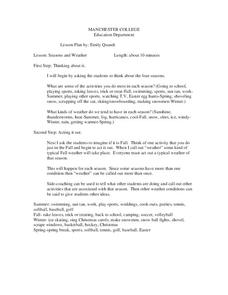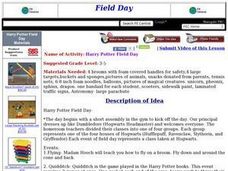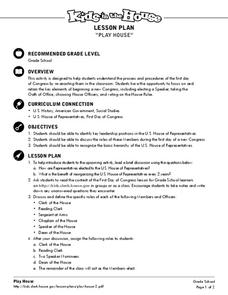Curated OER
Co-Operation: Drama
For some schools, character-counts lessons are a big part of the curriculum. This resource focuses on following directions and the importance of being a cooperative team player. Learners role-play a variety of situations by being...
Curated OER
Acting it Out
Students explore responsible behavior. In this character education lesson, students work in groups to act out scenarios using or disregarding responsible behavior. Students discuss personal feelings and consequences of each situation.
Curated OER
Act of Honesty
Middle schoolers analyze examples of honesty. In this character education lesson, students role play various situations and decide if they should engage in honest or dishonest behaviors.
Curated OER
Playing it Safe
Students explore the importance of an election and act as political advisers for an upcoming election. Students create platforms for various candidates, by writing a letter to their candidate with suggestions for winning the election.
Curated OER
Writing a Play about Immigrant Life in America
Students research why immigrants came to America and the processes involved in the settlement. They write a script for a short play explaining the causes for immigration and situations that immigrants found themselves in.
Curated OER
The First Amendment, What it Means and When Libel Comes in to Play
Students research three topics: The First Amendment, John Peter Zenger and his trial, and libel. In this journalism and libel lesson, students discuss things authority figures have done they disagree with and the anit-sedition law....
Curated OER
Early Explorers
Students answer short answer questions and participate in a role play where they are explorers being interviewed. In this early explorers lesson plan, students discuss why it is beneficial to be the first one in a place.
Curated OER
Yugoslavia: Death of a Nation
High schoolers discuss what they recall about the drama called "The Diary of Anne Frank." They discuss that although the diary itself is a nonfiction account of a teenager's life in hiding during the Nazi Holocaust. Students are...
Virginia Department of Education
Cell Parts
What do a bird, an egg, a rabbit, and a toad all have in common? This fun-filled resource explains the similarities and differences between cells and how all cells are similar, yet all are different. Learners begin by depicting a...
Curated OER
Seasons and Weather
Students, in an open forum with the teacher, discuss the four seasons and all the activities they do during each season. They tie in all the different types of weather that is experienced during each season. In conclusion, the students...
Curated OER
The Hardy-Weinberg Equilibrium
Students act out a drama in this lesson on one aspect of the Hardy-Weinberg Equilibrium. They are to follow all stage directions precisely and give it their best effort to get across the main points of the play.
Curated OER
Hamlet and the Elizabethan Revenge Ethic in Text and Film
Students discover how Shakespeare's play interprets Elizabethan attitudes toward revenge, as reflected in the structure of the Elizabethan revenge tragedy, one of the most popular forms of drama of that era. Students perform certain...
Curated OER
Harry Potter Field Day
Young scholars participate in a Harry Potter Field Day. In four groups, with each group representing one of the houses of Hogwarts, they fly brooms around cones, play Quidditch, create "Polyjuice Potion," use their "wands" to play...
Curated OER
Religion in Public Schools
Students examine the presence of religion in public institutions. In this ethics lesson, students focus on one aspect of the presence of religion in public institutions, and the controversy surrounding religion in the public schools....
Curated OER
Bee Dance
Everything a bee does serves a purpose. Learners in grades one through five explore the behaviors of bees through reading and dramatic puppet play. First children will create honey bee puppets, then they will discuss how bees dance to...
Curated OER
Dr. Seuss For a Day
Second graders brainstorm words to describe Thing One and Thing Two characters from Dr. Seuss computer program, use variety of adjectives to create descriptions, and create new set of characters, Thing Three and Thing Four, by drawing...
Curated OER
Hindsight is 20/20: Populists Advise Progressives
Students role play as Populist leaders and "advise" a group of newly founded Progressives about one of a specific list of topics. Then the Progressive personas speak about the success of their own reform efforts over the past decade.
Curated OER
1950's Rock and Roll
High schoolers complete an Individual Artist Information Sheet on famous 1950's Rock and Roll musician. They read one of the chapeters on "Elvis Pressley, Little Richard, Chuck Berry, Rockabilly, Jerry Lee Lewis, The Everly Brothers,...
Curated OER
Theatre: Persuasive Explorers
Students act like a famous explorer. In this explorer lesson, students research an explorer and act out persuasive arguments in which that explorer might be involved.
Curated OER
Current Events Activity
Students investigate world news and create a performance from their research. In this current events instructional activity, students identify major political or news stories in the media and create a performance based on a...
Curated OER
JANE AND THE DRAGON
Third graders act out a play called Jane and the Dragon. Students develop vocabulary through dialogue. They delve into the feelings of others through learning about the characters. They also identify the characteristics of various types...
Curated OER
Shakespeare in Parts
Students examine primary source manuscript fragments, discuss differences in performing a play without the entire script, and perform a scene from Twelfth Night with no preparation.
Curated OER
Play House
Students explore U.S. government by participating in a role playing activity. In this House of Representatives lesson, students discuss the first day of congress and the role the House plays in running the United States. Students define...
Curated OER
Comparing Characters Across Two Short Stories
Ninth graders listen to a read aloud of two short stories focusing on literary devices. The write about the settings and realism of the stories, and decide each main character handles the conflict he faces with nature.























